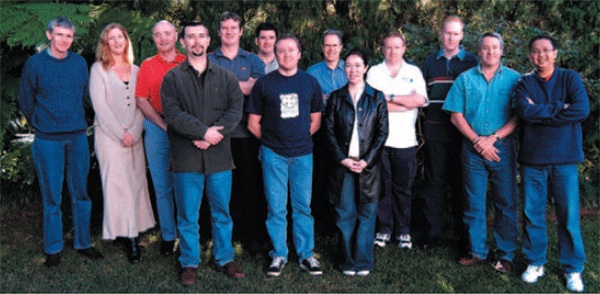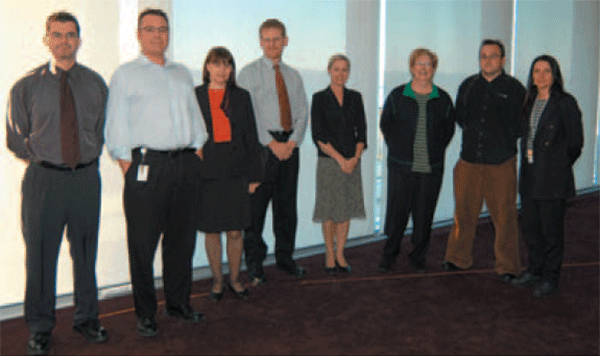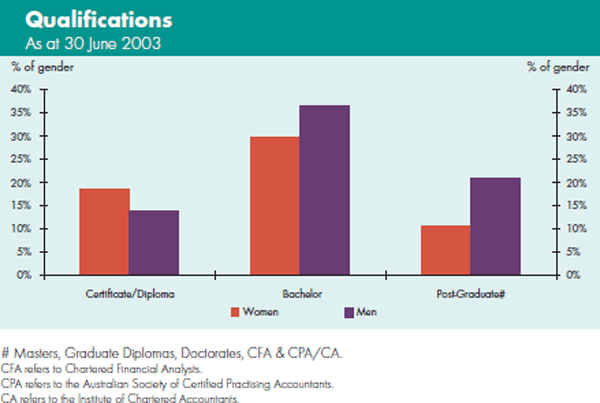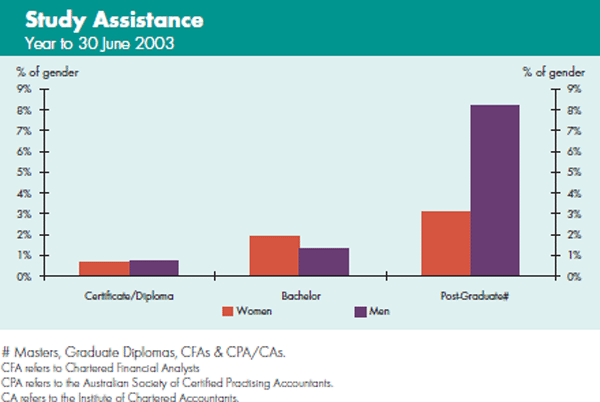Equity & Diversity Annual Report – 2003 2. Review of Policies & Practices
This section reviews policies and practices in relation to recruitment and selection, training and development, and conditions of employment from a diversity perspective.
2.1 Recruitment & Selection
General Recruitment
The RBA remains a popular destination for high calibre staff, as is evidenced by the results of the annual graduate, cadetship and traineeship recruitment programs. In the year just passed, there was an additional intake of graduates to increase IT staff resources who provide specialist support for the RBA's computer systems. On-line recruitment has proven to be an increasingly effective tool in promoting and streamlining recruitment processes. As a means of optimising exposure to potential applicants, Internet job boards and, less frequently, traditional media such as press and recruitment agencies continue to be used.
Graduates and Cadets
The 2002/03 graduate and cadetship recruitment campaign once again provided an effective means for departments to recruit high quality graduates. A larger number of applications were received this year through on-line recruitment. The Bank continues to advertise in the national press as well as having a presence on campus, and by circulating recruitment packs to Honours students at universities Australia-wide.
This year the RBA participated in a three-day Virtual Careers Fair run by Gradlink, which provided web-based information to students about prospective employers. This included hosting a one-hour forum via the Internet involving interaction with prospective candidates. This was an effective means for potential applicants to learn about the Graduate Development Program and working in the Bank.
The RBA also participated in The Australasian Graduate Recruitment Benchmarking Study. This inaugural study provided information on graduate recruitment practices used by over 100 organisations in Australia and New Zealand. The information has assisted the Bank to better respond to internal demands and keep abreast of the graduate recruitment market.
The RBA participated in the Axiss Scholarship Program, which provided an opportunity for talented finance or commerce students to participate in a program, which combines study with twelve weeks' paid work experience. The Scholarship has proven to be a good way of sourcing high calibre graduates for the Financial Markets Group as participants may, on completion of their Honours year, choose to apply for the Graduate Development Program. The Bank is currently sponsoring two students and has employed two former Axiss Scholars.
In 2002/03, 34 graduates, including eight women, were recruited into the two-year Graduate Development Program. The intake included three information technology graduates as well as 18 graduates from the 2001–02 Cadetship Program. The 2002/03 Cadetship Program had 14 participants, including five women.

Traineeships
Since 1986, the RBA has supported the Commonwealth Government's traineeship program, now known as the New Apprenticeship Scheme. Seven trainees were selected to participate in the 12-month Business Administration Traineeship program, commencing in March 2002. Trainees are rotated through three departments during their Traineeship. The group comprised four men and three women, including one person with a disability and one Indigenous Australian. On completion of the program in March 2003, six gained ongoing employment. To date, of the 199 trainees who have participated in the Program, 77 (39%) have been offered ongoing employment upon completion of their Traineeship.
Since 1995 seven Traineeships in Print Design have been offered. Last year a 12-month traineeship was offered to one female print design candidate. The Bank's first print design trainee, who was offered ongoing employment and subsequently a Printing Apprenticeship in 2000, completed his apprenticeship during this reporting period and became a trade-qualified printer at the Bank.
The RBA offered IT traineeships to two male applicants last year as part of a program which commenced in 1999.

Recruitment Initiatives
Redeployment of staff
Following the Adelaide branch closure, one female staff member was redeployed to a position within the newly established regional office in Adelaide.
2.2 Staff Training & Development
Graduate Development Program
The Graduate Development Program, which was introduced in 1991/92, is a two-year formal training schedule, aimed at developing graduates' skills in the areas of PC applications, business writing, professional presentations, leadership and career management. The Program has continually evolved to meet changing needs with some modifications made in this reporting period. Changes have involved a shift to all on-line PC training, the streamlining of leadership programs and the incorporation of more technical skills training in relation to writing and personal effectiveness.


Management Programs
During this reporting period three types of in-house program, designed to improve self-development and leadership capability for new and existing staff, were delivered. 25 staff members attended the in-house New Managers Program, including recent graduates and long-term employees.

On-line Learning
Over the past year a stronger focus has been placed on on-line learning following a 2002 on-line learning survey that showed that staff considered it to be an effective means for learning new skills. Available on-line course titles, which had traditionally been for IT specialists and PC users, have been widened to include management skills. Customised and interactive on-line learning modules relating to Equity & Diversity, OH&S and Privacy are also being developed and the On-line Orientation Program, implemented in February 2002, is being updated.
The new and improved modules will be introduced in the next financial year when new staff will undertake the training as part of their induction. The on-line modules will afford greater flexibility, as they will also be accessible by staff from their home PCs.
General Training
As in previous years, training programs were made available to staff and managers in a variety of areas including selection panel interviewing, performance appraisals, the electronic document management system, and Grievance Contact Officer training. An information update was also provided for the network of Diversity Contact Managers. The Diversity Contact Managers and Grievance Contact Officers regularly receive media update packs relating to equity and diversity issues in the public and business community. In this reporting period a new one-day training program on Managing Performance was successfully trialled. This program, which provides both theoretical and hands-on training for managers who have staff directly reporting to them, and who are involved in conducting performance appraisals, will be offered in the next reporting period.

One-third of all staff attended external training and nearly one-third of all staff attended formal in-house training (30% of women and 29% of men). In-house training figures exclude general PC software training and online training which is undertaken by all staff at induction and then throughout the year.
Of the 25 staff who presented papers on behalf of the Bank at conferences, seven were women. Springboard, a personal development program for non-managerial women, was once again made available.
A new induction pack was provided to all new employees. The pack contains relevant information for their first weeks in the Bank, including copies of the Equity & Diversity Annual Report.
Educational Qualifications
As part of an annual review, the recorded qualifications of staff were updated: 67% of staff are recorded as having a post-secondary or tertiary qualification, compared to 64% in 2002. This increase is partly due to the overall reduction in clerical roles in the Bank in recent years and also reflects a trend in the Australian population as a whole.
Of the 67% of staff who held a post-secondary or tertiary qualification, 26% held a post graduate qualification compared to 23% in 2002. Overall, 51% of staff now hold a bachelor degree or higher.

There is still a substantial gap between the genders with 59% of women holding a post-secondary qualification compared to 72% of men. 40% of women now hold a Bachelor Degree or higher compared to 58% of men. It is expected that the percentage of staff with post-secondary and post-graduate qualifications will continue to rise as a result of the declining number of clerical positions relative to professional positions.
Study Assistance
In 2002/03 the number of staff receiving study assistance increased to 66 compared to 59 last year. The percentage of women in the Study Assistance Scheme was down with 5% of women studying compared to 6% last year. For men, 10% received assistance in 2002/03 compared to 7% in the previous year. The majority of staff receiving study assistance are studying at a post-graduate level (74%). The most popular single post-graduate course was the Chartered Financial Analyst (CFA) program with 15 staff enrolled.

PGSA Study Assistance Committee 2002




One element of the RBA Study Assistance Scheme is the Post-Graduate Study Award (PGSA) program. This is offered each year to assist high calibre staff to undertake post-graduate studies on a full time basis. The PGSA represents a substantial investment by the Bank in upgrading the knowledge and skills of staff. During the year, 10 people (2 women) were studying via the PGSA program. Since 1981, when the PGSA was formally introduced, 69 staff have participated in the Program.
PGSA & Study Assistance Recipients







In 2002/03 the RBA continued to assist clerical staff in obtaining qualifications in Certificate IV Business Administration and the Frontline Management Diploma via in-house training through a Registered Training Organisation. A total of 14 staff (10 women and 4 men) completed these qualifications within the reporting period and a further six staff are currently studying towards a Certificate IV in Business Administration. Of those who have completed these programs a number are interested in pursuing further study towards a bachelor degree under the Bank's Study Assistance Scheme.

2.3 Conditions of Employment
An objective of the Diversity Plan is to ensure that personnel practices and policies are fair and equitable and assist in the retention of valued staff. During the year a number of policies were reviewed, and a number of enhancements to increase efficiency were incorporated in the 2003–04 Enterprise Bargaining Agreement, negotiated with the main workplace union, the Finance Sector Union (FSU).
Flexible Work Arrangements
Under the 2001–02 Enterprise Bargaining Agreement, the RBA and the FSU agreed to review flexible work options with the aim of streamlining the existing range of part time work provisions and developing a single set of arrangements that recognise both employee and Bank needs. Arising from that review, revised part time arrangements are expected to become operational in early 2003/04.
Working from Home
It is recognised that an option for employees to work from home in particular circumstances can further balance work and family needs and assist productivity. A trial of working from home arrangements will commence in early 2003/04, in line with guidelines agreed with the FSU. Subject to management approval, during the trial period employees may elect to work from home on an occasional and temporary short-term basis.
Salary Sacrifice for Superannuation
Salary sacrifice for superannuation was introduced in July 2001. In recognition that staff could benefit from an expansion of available options, the following items will be introduced over the next reporting period – charities under the Workplace Giving Program, laptop/palm computers and other relevant items recognised by the Australian Taxation Office.
Personal Leave
Currently, staff who work full time are entitled to 15 days cumulative Sick Leave and 5 days non-cumulative Carer's Leave each year. To provide greater flexibility for staff, the existing Sick and Carer's Leave arrangements are to be replaced by a cumulative Personal Leave entitlement of 18 days per annum, 10 days of which may be utilised in the event of family illness each calendar year.
Flexible Leave Options
To assist staff to better manage their work and family commitments it was agreed to explore, by end 2004, the possibility of introducing two additional leave options – a 48/52 week scheme whereby an employee could access an additional four weeks unpaid leave each calendar year, with salary averaged over the entire 12 month period; and the option to extend accrued annual leave by taking it on half pay.
Performance Pay Arrangements
New, more flexible, reward arrangements for staff are to be introduced from the 2003/04 appraisal year. Subject to a requirement for staff to be at desk at their classification level for a minimum period during the year (50 days), all salary increases and/or lump sum performance payments will be paid in full. The former rules that involved delayed salary increases and/or reduced lump sum performance payments where employees were absent for varying periods of the appraisal year, disadvantaged many staff, including those on extended parental leave for part of an appraisal year.
Consultation with Employees
Staff Matters, the staff newsletter, and the monthly staff magazine Currency were the principal means for providing information to staff relating to equity and diversity. A number of information update forums for staff were also held during the year and a survey on child care and a focus group for women who had recently returned to work from parental leave, were used to receive feedback from staff, allowing the Bank to monitor and identify appropriate equity and diversity initiatives.
During the year, each department was given the opportunity to nominate a new Grievance Contact Officer and training was provided to ensure Officers' skills and knowledge were kept up to date.
A review of the Grievance Authority is underway and expected to be completed in the next reporting period. For the fourth consecutive year no grievances were lodged with the Authority.
Consultation with Workplace Unions
During the year, the RBA consulted regularly with the FSU, primarily on the development of a new Enterprise Agreement for calendar years 2003 and 2004, to provide the basis for a pay rise to staff in each of those years. Consultation also took place on a range of award, health and safety, and other general employment matters.
